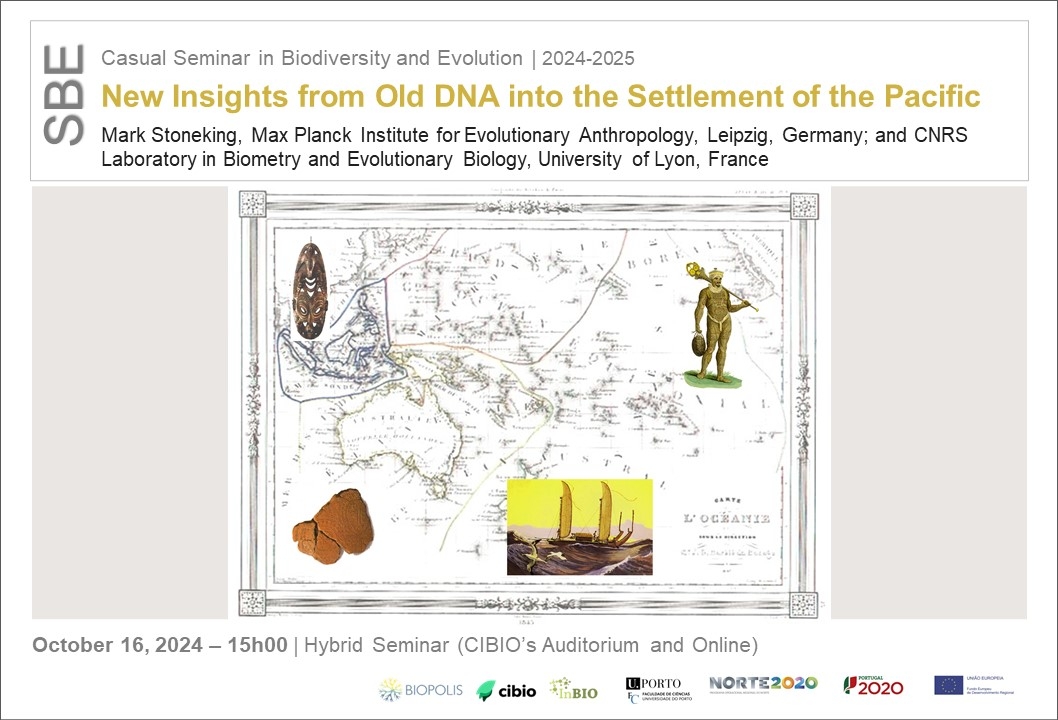New Insights from Old DNA into the Settlement of the Pacific
Event
CASUAL SEMINAR IN BIODIVERSITY AND EVOLUTION
October 16th, 2024
Mark Stoneking, Max Planck Institute for Evolutionary Anthropology, Leipzig, Germany and CNRS Laboratory in Biometry and Evolutionary Biology, University of Lyon, France | 15h00 | Hybrid Seminar

CASUAL SEMINAR IN BIODIVERSITY AND EVOLUTION
The human settlement of the Pacific, involving long open-ocean sea voyaging, has long fascinated anthropologists, archaeologists, linguists, and geneticists. The current view is that Near Oceania (consisting of the islands of Eastern Indonesia, New Guinea, and Australia, extending as far east as the main chain of the Solomon Islands) was initially colonized ~45,000 years ago, which involved relatively short island crossings that were intervisible (i.e., there would be indications of land ahead before losing sight of the land behind). The next major development was the expansion of Austronesian-speaking people out of Taiwan beginning 4,000-5,000 years ago; these were the first people to reach the islands of Remote Oceania (Santa Cruz, Vanuatu, New Caledonia, Fiji, and Polynesia and Micronesia), beginning ~3,200-3,500 years ago, and involving crossing hundreds to thousands of kilometers of open ocean. However, within this general framework of two major migrations to the Pacific, there remain many questions, and I shall discuss insights from ancient DNA evidence into two of these: 1) the timing and impact of the Austronesian expansion on eastern Indonesian populations; and 2) the origin of the first colonizers of the Marianas Archipelago, in western Micronesia, and their potential role in the further settlement of the Pacific.
Mark Stoneking received his PhD in genetics from the University of California, Berkeley in 1986. After postdoctoral work at Berkeley he held research scientist positions at the Human Genome Center at Lawrence Berkeley Laboratory and at the Cetus Corporation. He joined the faculty of the anthropology department at The Pennsylvania State University as an assistant professor in 1990, rising to associate professor in 1994 and full professor in 1998. In 1999 he left Penn State for the newly-established Max Planck Institute for Evolutionary Anthropology in Leipzig, Germany, where he supervised the Human Population History Group and was Honorary Professor of Biological Anthropology at the University of Leipzig until his retirement in 2022. He is currently affiliated with the CNRS Laboratory of Biometry and Evolutionary Biology at the University of Lyon in Lyon, France. His research interests involve using molecular genetic methods to address questions of anthropological interest concerning the origins, migrations, and relationships of human populations, the impact of cultural practices on human genetic diversity, and the influence of selection during human evolution. He has authored more than 300 scientific papers, and a textbook, Introduction to Molecular Anthropology (Wiley, 2017), and has received numerous scientific awards, including election to the US National Academy of Sciences in 2020, and he was the recipient of an Honorary Doctorate degree from the University of Lyon in 2022.
[Hosts: Anne-Maria Fehn & Jorge Rocha, Human Evolutionary Genetics - HUMANEVOL]
